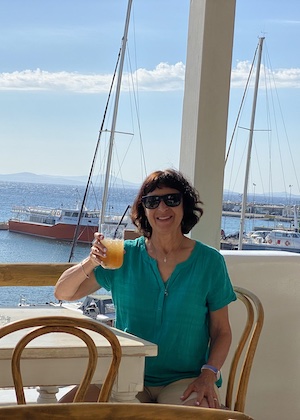By Lauren Toneatto
“Well, I can tell you one thing, with a liberal arts education you really learn, or at least I did at Berkeley, how to write. And I think that writing is the most critical skill for whatever you end up doing with your life, or whatever path you pursue career wise.”
— Betsy R. Rosenthal (ΦBK, University of California, Berkeley)
When reading the fall 2022 issue of The Key Reporter, you may have noticed Betsy R. Rosenthal’s (ΦBK, University of California, Berkeley) When Lightnin’ Struck listed amongst other Phi Beta Kappa authors, given the recent release of her newest middle grade novel. With seven published children’s books, numerous personal essays in magazines and newspapers, poetry collections, and ghost-written works, nowadays Rosenthal spends her time as a full-time author. But Rosenthal did not always pursue her dream of writing the next great American novel as a career. Given her background as a former-lawyer, world traveler, and lifelong learner, Rosenthal shares advice worthwhile to all Phi Beta Kappa members, not just those who hope to see their names on the best-seller list.
Rosenthal continually circled back to “broad” when thinking about how her undergraduate education influenced her initial career as a lawyer. During her undergraduate studies at UC Berkeley’s College of Letters & Science, Rosenthal majored in social welfare with a minor in political science. “It gave me a broad education, which I think is important and helpful for law school,” Rosenthal reflects. “The broader your education, the more you can understand the various problems you are going to encounter vis-à-vis legal issues and people’s problems that require them to seek out legal assistance.” Rosenthal initially pursued law to couple her childhood love of writing with her parents’ insistence on her argumentative spirit. Confronting the difficulty of adeptly managing a career that entailed an abundance of travel and night meetings while still being present for her children, Rosenthal decided to leave behind her law career and pursue her passion for writing.
When debating whether to take the leap from one profession to another, Rosenthal suggests, “I think it’s important for your sense of self-worth and enjoyment of life to try to pursue your passion. And if you’re in a job that you’re not enjoying, and it’s just drudgery, then I think it’s time to make a change.” Thinking back on her liberal arts and sciences education, a background that all Phi Beta Kappa members share, Rosenthal sees the value in learning how to communicate. “Whether you end up going into medicine or business or engineering, you need to be able to communicate,” she says. As an author, communication is key in many facets of Rosenthal’s work. According to Rosenthal, effective communication is of paramount importance when writing for children, especially in the writing of picture books, as “every word is significant and critical and you can’t have any superfluous words,” Rosenthal elaborates. “Publishers are looking for the bare minimum of words.” Beyond word count, Rosenthal expands on the high level of trust necessary between an author and their editor. When thinking about communication and collaboration, a fact that might surprise picture book readers is that “typically the illustrator and the writer never meet, and not only do they not meet in person, but they don’t even communicate with one another,” Rosenthal explains. The editor serves as a bridge between them and communicates separately with each.
One avenue by which Rosenthal does have direct communication with other industry players is through her writing group. Given the self-discipline required for writers to produce work and meet deadlines, Rosenthal has found the accountability and feedback of her writers’ critique group invaluable to her success. “I have been with the same – well now we’ve kind of dwindled and we’re down to three of us – core of writers for about 27 years,” Rosenthal says. Rosenthal advises all aspiring professional authors to take writing classes at your local university, the launching pad for Rosenthal’s long-lasting critique group. In terms of advice for Phi Beta Kappa members venturing down other career paths, “I highly recommend if you’re going to go off to graduate school in whatever subject, it’s so wonderful to have a little life experience under your belt.” For Rosenthal, this life experience meant a two-year gap before entering law school. She spent over a year living in a border town in Israel and then working in San Francisco after her UC Berkeley graduation.
Another piece of advice Rosenthal gives to all current students, soon-to-be graduates, or young alumni is to travel. “Because there’s nothing that opens your mind more and allows you to become a citizen of the world than traveling and meeting people from all different walks of life and all different cultures speaking all different languages,” Rosenthal says. “If you can afford it, I highly recommend it as the best education you can get.” If you don’t foresee yourself flying around the globe or crossing country borders soon, a liberal arts education will do just fine in terms of world building. Rosenthal concludes, “a liberal arts education opens your world and your mind to exploring a variety of subjects you might never have considered. You learn much more about people and about the world.”
Lauren Toneatto is a recent graduate of Brown University with a double concentration in the history of art and architecture and in English. She was inducted into Phi Beta Kappa there in June 2022. Brown University is home to the Alpha of Rhode Island chapter of Phi Beta Kappa.




